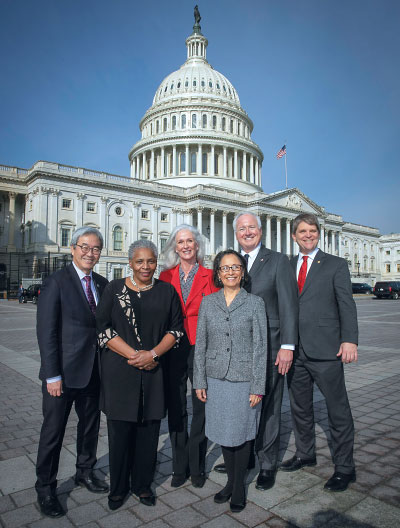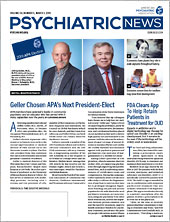APA and its coalition of frontline physician organizations joined forces last month to lobby key members of Congress on issues critical to physicians and their patients’ health.
In meetings with lawmakers, among the issues that the coalition discussed were to make prescription drugs more affordable; shore up the individual health plan marketplaces created by the Affordable Care Act; ensure the funding of critical health care priorities, including research on gun violence; and reduce administrative burdens on physicians, such as insurance companies’ prior authorization requirements for medications.
The lobbying mission was the latest of several undertaken by the Frontline Physicians: The Group of Six since the group formed in fall 2016 to prevent the repeal of the Affordable Care Act. The coalition represents some 560,000 physician and medical student members who are directly involved in patient care.
“We believe very strongly as physicians that improving lives requires full access to care as well as effective workforce development,” said APA President Altha Stewart, M.D., at a press briefing before the congressional visits. “And that means we are focused on the care of the whole person—mind, brain, and body—over the entire lifespan.”
In addition to APA, other coalition members include the American Academy of Family Physicians, American Academy of Pediatrics, American College of Physicians, American College of Obstetricians and Gynecologists, and American Osteopathic Association.
One of the main focuses of the lobbying effort, for which leaders from each of the six groups traveled to Washington, D.C., was to encourage Congress to help improve the affordability of prescription drugs. In the past decade, nearly one-third of brand-name medications for depression and anxiety experienced an “extraordinary” price increase, defined as an increase of at least 100 percent at a single point in time, according to a report by the General Accountability Office. The coalition members talked about the rising cost of even generic and decades-old prescription drugs, such as the antibiotic doxycycline and insulin.
Ana Maria Lopez, M.D., M.P.H., president of the American College of Physicians, said at the press briefing that patients sometimes come in with a list of medications, yet their refill dates do not line up. “They tell me, ‘I can afford to take these two medications on a daily basis, and these two medications only twice a week. ... I can fill my medications or I can pay my rent.’ They really are making these kinds of choices. It’s a process for patients that endangers their lives.” Another physician told about his patient who had skimped on her insulin because she could no longer afford it due to recent price spikes and needed amputation as a result.
“In psychiatry, many of our patients get stabilized in a hospital on cutting-edge drugs, but when they are released to their communities, they are told their insurance formulary does not support continuation of particular medications. It’s a battle for us,” explained Stewart. “As a result, patients discontinue their medications and get rehospitalized because they are no longer stable.
Not only does it increase costs, but it inflicts tremendous human suffering.”
Stewart and coalition members also expressed grave concerns to lawmakers that rising prescription drug costs are resulting in health plans removing critical drugs from approved formularies and stepping up their use of prior authorization and step therapy. In fact, a regulation recently proposed by the Centers for Medicare and Medicaid Services (CMS) would do just that: allow Medicare plans to adopt greater use of “utilization management tools” when it comes to prescription drugs in the Part D and Part B plans.
Current policy requires Medicare Part D plans to cover all or substantially all drugs within six protected classes, which includes antidepressants, antipsychotics, and anticonvulsants. However, the proposed rule would allow Part D plans to increase use of prior authorization and step therapy for protected-class drugs, as well as create formularies that exclude some protected-class drugs in certain instances.
“In fact, nearly one-third of drugs in the protected classes are already not covered, and the proposed rule would incentivize plans to further limit the availability of life-saving medications,” Stewart said.
APA is hoping to build on its small win last year to reduce patient drug costs when it supported a bill that bans so-called “gag clauses.” The gag clauses were added to pharmacy contracts by health plans and barred pharmacists from disclosing to patients when it would be cheaper for them to buy a particular medication without using their insurance plan. The Patient Right to Know Drug Prices Act was ultimately signed into law by President Donald Trump last October.
With regard to reducing administrative burdens for physicians, Stewart said, “As physicians, we believe our primary task must be the treatment of patients, not filling out paperwork and completing other administrative tasks.”
Although the focus of the meetings on Capitol Hill was on the shared goals of the Frontline Physicians, Stewart touched on some issues that are unique to psychiatry, including improving enforcement of mental health parity. Stewart also urged lawmakers to eliminate barriers for psychiatrists to provide mental health and substance use care via telehealth. She also pushed for expanded access to integrated care, such as the Collaborative Care Model, whereby psychiatrists lead a team of behavioral care managers and primary care providers who in turn provide direct care to patients.
“Integrating behavioral health and general medical services has been shown to improve patient outcomes, save money, and reduce stigma,” Stewart said.
APA’s Chief of Government Relations Craig Obey, who accompanied the Frontline Physicians leaders on their visit to Capitol Hill, noted the physicians’ anecdotes of patient experiences is what moved the lawmakers most.
“When you give facts and explain, people can understand something intellectually, but you’ve got to move someone emotionally to get them to act,” Obey said. “It was apparent that our six organizations matter and that our voices are more resonant when we are aligned. The whole really can be stronger than its parts.” ■
More information on America’s Frontline Physicians: The Group of Six can be accessed
here.

